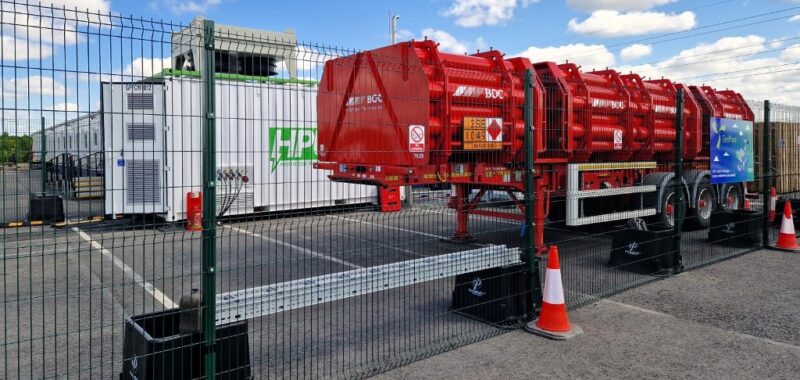Balfour Beatty says that it is the first UK contractor to integrate hydrogen-powered generators into its standard operational framework.
GeoPura’s hydrogen power units (HPUs) are fuel cells manufactured by Siemens Energy in Newcastle on a subcontract basis, to Geopura’s designs.
Balfour Beatty has committed to deploying Geopura HPUs across its UK sites where grid connections are not available and high power capacity is required. Diesel will remain the norm for the next few years but Balfour Beatty is among construction companies that have been putting in place the supply chain to be able to offer alternatives.
Approximately 20 of Balfour Beatty’s 300 or so live UK construction sites are currently powered by alternatives to traditional diesel generators. Low carbon alternatives are generally more expensive and require supportive clients prepared to pay the premium.
HPUs will continue to be inappropriate for most sites in the short or medium term; but where they are, Balfour Beatty has GeoPura. And, as and when costs come down, the proportion of hydrogen-appropriate sites is likely to rise.
GeoPura was established in 2019 and Siemens has since produced approximately 50 of its HPUs. Geopura expects to be adding around eight units a month in 2025.
Standard units are 250 kW; a new 500 kW HPU2 version becomes available in early 2025.
With shareholders including General Motors Ventures and SWEN Capital Partners, as well as Siemens Energy Ventures, Geopura has the backing to step up supply as market demand grows. That, it seems depends a lot on construction clients.
Balfour Beatty director of technical services Kevin Randall says that deployment of HPUs is currently two or three times the cost of an unmitigated diesel generator – the conventional type, with no supporting flywheel or battery storage unit to maximise efficiency.

GeoPura managing director Andrew Cunningham says that the capital cost of the equipment will come down, “and Balfour Beatty is no small part of this because of the commitment they are making,” he said.
However, there is also the cost of hydrogen fuel and getting it delivered to site, which Randall says is equivalent to paying about £2.50 a litre for diesel, instead of around £1.50 or less, which is what (white) diesel currently costs.
GeoPura is also ramping up its fuel delivery capability and by the end of this month will have a fleet of 60 trucks delivering compressed hydrogen gas in cylinder tank arrays.


One construction client that has already shown solid support to hydrogen fuel – and other diesel alternatives – is HS2 Ltd, whose high-speed rail project is so famously environmentally gold-plated that even its chairman has called it out for spending £100m on a bat shed.
GeoPura’s HPUs have been deployed by several HS2 contractors, including EKFB (on two sites in Aylesbury), SCS (for the Victoria Road crossover box near Old Oak Common) and Balfour Beatty Vinci in Kingsbury, Warwickshire.
Kevin Randall says that connecting to the electricity grid remains the optimum way to power a construction site but even in cities as big as London that is not always easy. “It is a constant challenge,” he said. “We don’t start on site until we’ve won the work in the first place and then it can take up to nine months to get a power supply in from a DNO [distribution network operator], or even longer for a big power supply, for a TBM [tunnel boring machine] for example.”
So this may well prove another incentive to clients to pay the HPU premium.
But once the products become more available and the costs come down, Randall says, Balfour Beatty and other UK construction contractors stand “absolutely ready” to deploy diesel alternatives to any client “willing to support us on this journey”.

